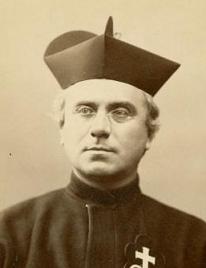
- a square cap with three ridges on top worn by clergymen especially of the Roman Catholic Church (Merriam-Webster)
Department of English
Faculty of Arts, Chulalongkorn University
First
Confession
(1951)
Frank O'Connor
(September 17, 1903 – March 10, 1966)
"First Confession" Notes
This short story was first published as "Repentence" in Lovat Dickson's Magazine in 1935, under its current title in Harper's Bazaar in 1939, and later revised and collected in Traveller's Samples: Stories and Tales in 1951, with a few other published variations.
175 porter: a dark beer
|
|
|
|
|
 |
|
|
"Repentance"
(1935) |
"First Confession" (1939) | "First Confession" (1951) | ||
| Micky had to explain what sort of woman his grandmother was, that she drank porter, took snuff and went about the house in her bare feet. It was all made infinitely easier because the priest never once took his eyes off Micky's face, and at eery few words interrupted with a sympathetic "Tut-tut!" or "Well! well!" As he seemed to be so interested and understanding, Micky thought he might as well tell him the whole thing; how he had planned to come behind her while she was eating a meal of potatoes and hit her over the head with a hatchet. They had a discussion about the hatchet. The priest thought a knife would have been better, as there would be a danger that the old woman would scream. Micky admitted that he hadn't thought of that, but this wasn't quite true, as he had thought of it vaguely, but had rejected it because he couldn't imagine himself running a knife into her. (68–69) |
"And why do you want to kill her?" "Oh, God, father, she's a horrible woman!" "Is she now?" "She is, father." "What way is she horrible?" Jackie paused to think. It was hard to explain. "She takes snuff, father." "Oh, my!" "And she goes round in her bare feet, father." "Tut-tut-tut!" "She's a horrible woman, father," said Jackie with a sudden earnestness. "She takes porter. And she ates the potatoes off the table with her hands. And me mother do be out working most days, and since that one came 'tis she gives us our dinner and I can't ate the dinner." He found himself sniffling. "And she gives pinnies to Nora and she doesn't give no pinnies to me because she knows I can't stand her. And me father sides with her, father, and he bates me, and me heart is broken and wan night in bed I made it up the way I'd kill her." (118) |
He seemed a bit shaken by that all right, because he didn't say
anything for a while. "My goodness," he said at last, "that'd be a shocking thing to do. What put that into your head?" "Father," I said, feeling very sorry for myself, "she's an awful woman." "Is she?" he asked. "What way is she awful?" "She takes porter, father," said I, knowing well from the way the mother talked of porter that it must be a mortal sin, and hoping it might make the priest see my point of view. "Oh, my!" he said. "And snuff, father," said I. "She's a bad case all right, Jackie," he said. "And she goes round in her bare feet, father," said I. "And she know I don't like her, and she gives pennies to Nora and none to me, and my da sides with her and beats me, so one night I was so heart-scalded I made up my mind I'd have to kill her." "And what would you do with the body?" he asked with great interest. "I was thinking I could cut it up and carry it away in a barrow I have," said I. "Begor, Jackie," said he, "do you know, you're a terrible child?" "I know, father," said I. (I was thinking the same thing myself.) "I tried to kill Nora too, with a bread knife, under the table, only I missed her." (12–13) |
|
Study Questions
|
Review Sheet
Characters
Jackie – the narrator; seven years old ("a fellow confessing after seven years")Setting
Jackie's house –
Vocabulary
Sample Student Responses to Frank O'Connor's "First Confession"
Study Question:
Response 1:
|
|
| Links |
|
| Media |
||
|
||
|
||
|
||
|
| Frank O'Connor |
|
Reference
O'Connor,
Frank. "First Confession." Collected
Stories. New York: Knopf, 1981. 175–82. Print.
Further Reading
Last
updated
September 1, 2014